
Plant
Flowers from Seed
Carnations, larkspur, nasturtium, petunias, poppy
Garden Guide: Planting Fall & Winter Annuals
Flowers from Transplant
Pansies, petunias, alyssum, dianthus, snapdragons, ornamental cabbage and kale, geraniums
Hardy Trees, Shrubs and Vines
The roots of hardy plants grow during our cool months even though their leaves may be changing color or falling from their branches. This provides a better root system so they thrive in spring and can survive the long, hot summer. Live oaks, magnolia, cedar elm, hawthorns, holly, sage, junipers, roses, just to name a few, are winter hardy and would be appropriate to plant now. Read more: Plant Hardy Trees And Shrubs Now
Garden Guide: Planting Trees, Shrubs & Groundcovers, Roses
Veggies from Seed
Beets, cabbage (all types), carrots, chard, lettuce, mustard, onions, peas, radish, spinach and turnips
Christmas cactus is one of nature’s gifts for those who are gardening challenged. Just keep them dry and in very filtered light. How’s that for easy?
A beautiful holiday plant, the Christmas Cactus blooms at Christmas and also sometimes around Easter if cared for properly. Keep the plant in a well lit location (like near a window) away from direct sunlight-too much heat and light can stunt the growth and burn the leaves. It should also be away from drafts, heat vents, or other sources of hot air. Feel the soil with your fingers; if it is dry, it’s time to water thoroughly. Before watering again, check to see that the top inch of soil has dried thoroughly first. Mist leaves as well as watering the soil.
Read more: Christmas Cactus.
Fall bulbs like paper whites and amaryllis, will make a spectacular show this winter and now is the time to plant them.
Paperwhite Narcissus
1. Refrigerate for 4-6 weeks prior to planting.
(plant around Thanksgiving for holiday blooms!)
2. Fill a clear vase with a few inches of pea gravel.
3. Nestle bulbs side by side into the gravel.
4. Add water up to the bottom of the bulb and
place near a sunny window.
Amaryllis
Plant in a pot or in the ground. If planting in the ground, place in morning sun and afternoon shade. Every three years in October, you can dig up and divide these bulbs as they multiply underground! Feed regularly with Hi-Yield Bone Meal every 4-6 weeks.
Indoor Plants
Bring fresh air and interest indoors. Houseplants like schefflera, sanseveria, pothos ivy, & philodendrons bring a clean organic feel to your home. While you move plants in from outdoor areas, be sure to check for insects and treat if needed.
Read: Plants, the Perfect Rx for Clean Air
Poinsettias indoors do best in cool dry areas with indirect light. An easy way to water them is with a few ice cubes every few days. Read: Poinsettia Care
Fertilize
BEDDING PLANTS
Fertilize organically with Hastagro, Medina Growin Green, or Milorganite, or conventionally with Osmocote Time Release 14-14-14.
Do not fertilize TROPICALS this month. They need to rest.
LAWN
If you didn’t fertilize your lawn in October or November, instead of applying a chemical fertilizer, we recommend you use an organic fertilizer such as Medina Growin Green or Milorganite. These products feed the grass & soil microbes slowly and naturally.
Watch Out For
Read: Protect Your Lawn – Recent Take-All Root Rot Sightings
SCALE
Insects on hardy trees and shrubs. Spray with Neem Oil spray or Dormant Oil.
Read: What’s Bugging You Now?
LAWN FUNGUS
This can be a major problem after long periods of wet, cool weather or over watering. There are two major kinds of lawn fungus – Take All Patch and Brown Patch. Treat Take All Patch organically with Nature’s Blend Organic Compost, or Peat Moss, or conventionally with Fertilome Systemic Lawn Fungicide or Scotts DiseaseEX.
Treat Brown Patch Fungus with Fertilome F-Stop Granules.
Water
- Only as needed – but dry cold fronts, high winds and low humidity can dry plants quickly.
- Established lawns only need water every couple of weeks, provided we don’t get rain.
- Be sure to check your sprinkler system and adjust accordingly.
Prune
- Perennials that have finished their bloom.
- Pick spent flowers from annuals to prolong their bloom season.
Harvest Citrus
- Starting in December, and more in January, harvest your lemons, limes, grapefruit, oranges, and other citrus fruits. What a great holiday gift!
- If you notice any fruits with black gunk on them, it's likely honeydew from insects. Treat with organic All Season Horticultural Oil spray to suffocate any lingering insects.
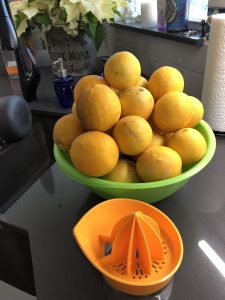
Be Ready for Frost Protection!
- We never know if we might get an early freeze in December, so have your frost blankets handy.
- When covering plants for a freeze, make a tent to capture ground warmth - not a lollipop! The frost protection cloth should extend all the way to the ground and be pinned to the ground or, better yet, weighed down with bricks or firewood - something heavy so they don't blow away in high winds.
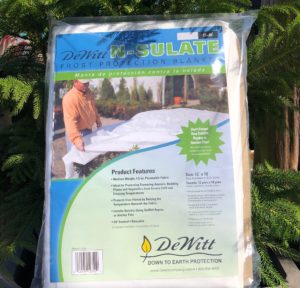
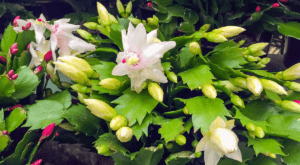
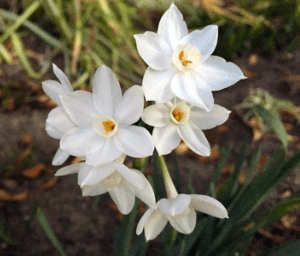
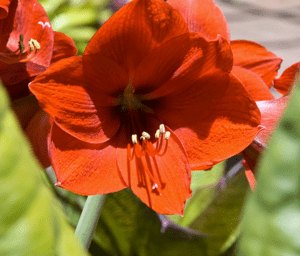
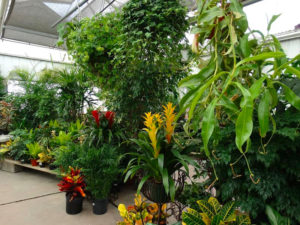






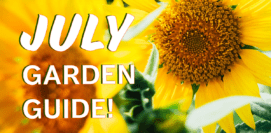


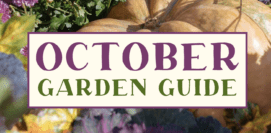




Jesse says
Typically, Valentine’s Day in South Texas is the time to do hard cut backs (heavy pruning), but if the weather is still consistently cold, wait until it starts warming up. This would also be the time to start fertilizing the Powder Puff either in pots or in the ground, and also the Foxtail Fern.
Jennifer Dixon says
Go info I have 13 fox tail..
When to prune “powder puff” and firtilize..have in pots…
Maxine Keeton says
When in Dec. do you cut Asparagus down? Thanks!
james gill says
If they start to yellow from cold in December you can take that as a sign to cut down. If temperatures stay very mild and tops are still green I would wait until January to cut down. Remove clippings from bed to avoid overwintering insects.